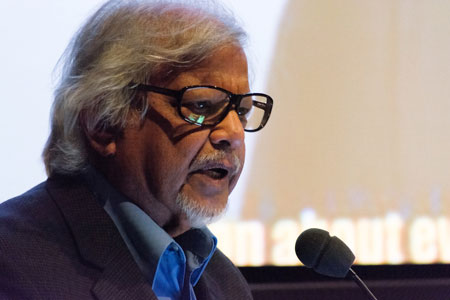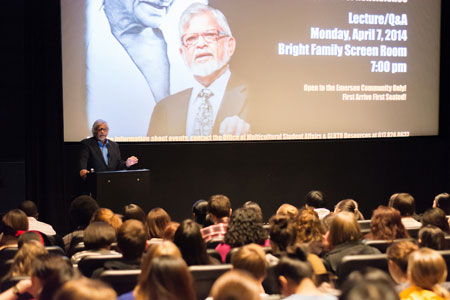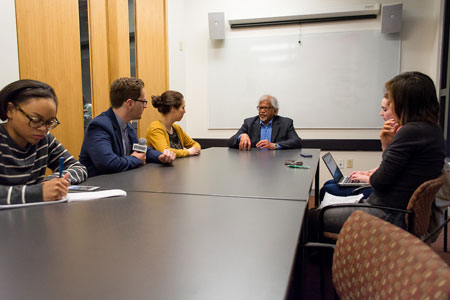Arun Gandhi shares nonviolence wisdom
Arun Gandhi, peace activist and grandson of Mohandas Gandhi, spoke at the Bright Family Screening Room to a full house of students about his grandfather’s philosophy of nonviolence.

Arun Gandhi at the Bright Family Screening Room on April 7. (Photo by Michelle Kwong ’15)
“We need to live as human beings, treat each other as human beings and not divide people by their nationalities, genders, race,” he said.
Arun described the many lessons Gandhi taught him about the true definition of nonviolence and how to channel anger into positive energy. He now shares this message with thousands of people every year on speaking tours.
Arun was 12 years old when his parents sent him to visit his grandfather. He grew up during the apartheid in South Africa where other children—both black and white—beat him because of the color of his skin. He became resentful and angry toward them.
Arun said his visit with Gandhi taught him many lessons about how to handle his anger—an important foundation of nonviolence.
“Anger is not evil, not bad, not something to be ashamed of,” he said his grandfather told him. “Anger to human beings is like fuel to the automobile. If we don’t have anger, we will not be able to do the things we are supposed to do. We abuse anger instead of using it intelligently.”

Arun Gandhi speaks to a full house at the Bright Family Screening Room on April 7. (Photo by Michelle Kwong ’15)
Without using anger constructively, Arun said humans could never become nonviolent. Arun said his grandfather recommended keeping an “anger journal” to record the incidences that sparked frustration.
“What helps is if you write the journal with the intention of finding a solution and commit yourself to finding a solution,” he said.
In one lesson about nonviolence, Gandhi taught Arun about the consequences of waste. Arun had disposed of his three-inch pencil because it was too small and asked his grandfather for a new one. Gandhi refused to give him a new pencil and told him to find the old one. He said by throwing away the pencil he was discarding the world’s natural resources and committing violence against nature.
“And that was the first time I realized that all these little things that we do every day, things that we over-consume or throw away because we have so much,” he said, “all of these things are acts of violence.”

Arun Gandhi speaks with student journalists in the Multipurpose Room at the Mutchnick Campus Center before his speech. (Photo by Michelle Kwong ’15)
Arun described Gandhi as a compassionate grandfather behind the scenes.
“What I’m really amazed at is, the time I lived with him, he was involved with many issues because everything he lived for and worked for was coming to a boil,” he said. “But in spite of that, he would make it his mission to devote at least one hour to me every day. And he pulled himself away from all of these things and sat with me and was just a plain old grandfather: telling me stories, teaching me lessons, and helping me with my homework.”
Arun has carried on his grandfather’s legacy through his peace activism. He has started organizations such as the M.K. Gandhi Institute at the University of Rochester and the Gandhi Worldwide Education Institute. He continues his speaking tours to spread his message of nonviolence to a new generation of students.
The Office of Multicultural Student Affairs organized Arun Gandhi’s visit to campus.
Categories